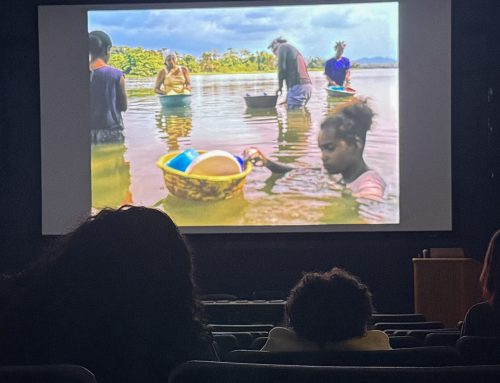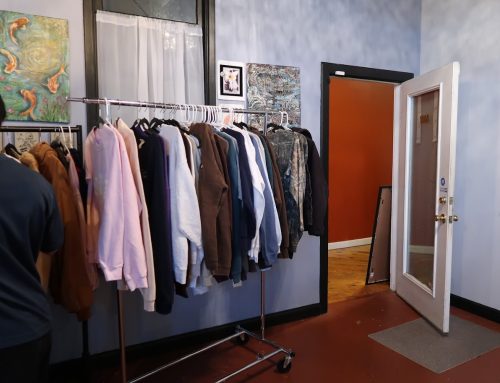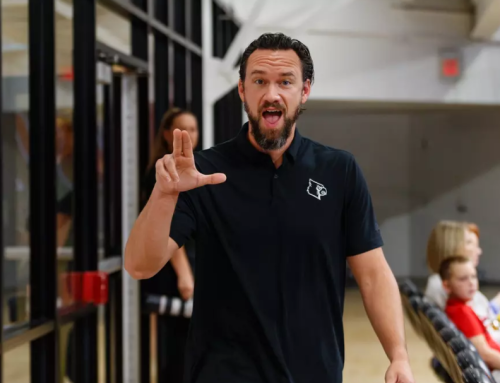We’ve all read about it, learned about it, watched movies inspired by it, and yet, none of us can imagine the true feelings of hopelessness, dread and horror that victims of the Holocaust felt during one of the most horrific genocides in world history.
The University of Louisville was honored to have Irving Roth give a speech about his childhood, which unfortunately included the Holocaust. Roth, born in Czechoslovakia in 1929, has visited over 150 colleges to talk about his experiences.
Cards United for Israel (CUFI), have a chapter at U of L called ECHO, with student members from U of L, JCTC and UK. They invited Roth to come and speak about his life story on March 25. The event was open to the community, with audience ranging from students to older attendees.
“Today, I will be speaking about something called the Holocaust,” Roth said. Throughout the course of the speech, Ross switched gears, determined not to create too much tension, adding a little bit of a humor into something that would normally be a very solemn topic. He talked briefly about his life before the Holocaust, when he lived with his parents, younger brother and grandparents.
“At age six, I was carefree. The best things about life were girls and living with my grandparents—because they were easy to manipulate,” he said, which resulted in quiet laughter from the crowd.
He then went on to explain how his life slowly starting changing. Friends and neighbors turned on him. He wasn’t able to attend school. He got kicked off the soccer team. His father lost his job.
“Before I knew it, I had a limitation on my life. What was my crime? Being born a Jew,” Ross said.
Soon, his family moved to Hungary, which seemed consistently safer than their home in Hummene. Soon after, however, they were captured by Nazis and driven somewhere in a boxcar “smaller than the Humanities building” with no windows or seats. After three days of darkness, they got out and found themselves in the most grueling death camp: Auschwitz.
The audience listened in stunned silence as Roth talked about how he survived the “selection” process. His grandparents and 10 year old cousin did not fare well, as they were either too old or too young or not in good enough shape to be put to labor.
Roth then described how there would be times when the entire group, including him and his brother, would be led into showers, stripped of their clothes and briefly looked over by a doctor, who would then declare whether or not they were fit. Those who weren’t deemed fit would be murdered.
No matter what happened, Roth kept his hope alive. He kept it alive during the dreadful days, while those around him died, either from malnourishment, being worked too hard or by uniformed men. He kept it when he lost his brother. He kept it during death marches. He kept it until April 11, 1945 when American soldiers arrived at the camp.
Roth described it as “liberation,” when he laid his eyes upon two American soldiers.
“I’m alive and the war is over, my friends.” At this time, Roth, 15, weighed a dangerous 75 pounds.
Miraculously, both his parents, with whom he had been separated, also survived the death camps. Two years later, Irving Roth came to the United States of America, where he started a family. Today, he lives with his wife, and has a whole family tree under him: two sons, four grandchildren and a great grandchild. He occasionally visits Auschwitz and tells his personal stories about the living hell he experienced there.
Roth ended his speech with grueling facts about Israel; after all, he was primarily there due to their support group. After the speech, he discussed current issues.
“Living through it makes it difficult,” he said. “But at the same time, there are people who want to understand and appreciate what went on. Telling it to your children is very positive and very rewarding.”
He offered advice on how people today could prevent something like the Holocaust happening again.
“Right now, the world is in terrible shape. The world has unraveled. One of the scariest parts is that we accept murder as a political tool,” Roth said. “We need to learn from history. . . I suggest the experience of listening, (it) will give you a sense so that when you see something like (prejudice), you can stop it and say that’s not right. We need to step back for a moment and stay ‘stop.’ Prejudice is something that can create a genocide, like the Holocaust.”
His final advice: “Question everything.”






